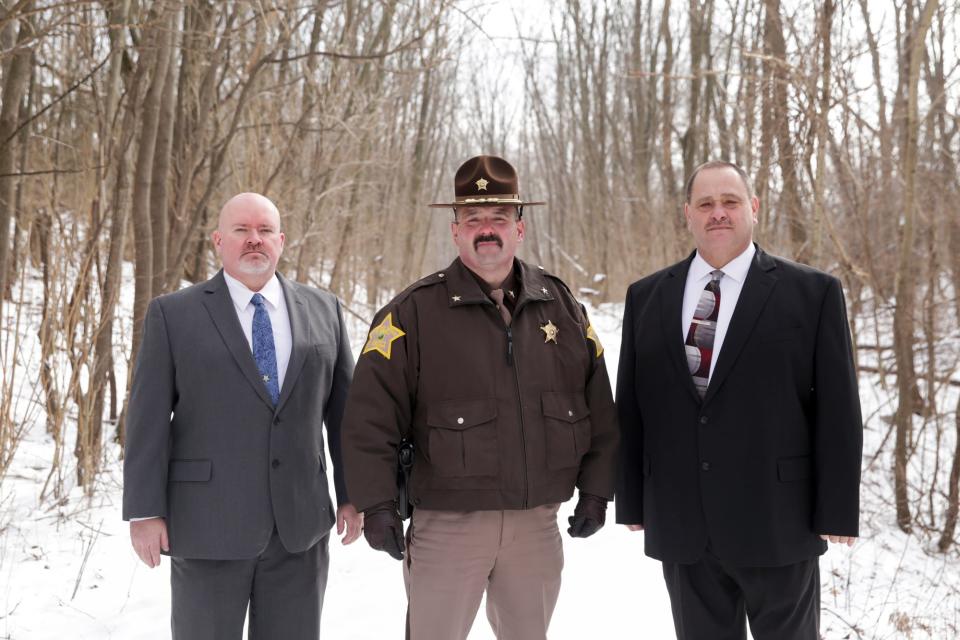THE LATEST: Find live coverage from Friday, Oct. 25 here
The trial of Richard Allen continued Oct. 24 in Delphi, Indiana, in the killings of Abigail “Abby” Williams and Liberty “Libby” German.
Richard Allen, 52, is accused of killing two teens who went missing Feb. 13, 2017, and were found dead the next day. He was arrested in 2022 and faces two counts of murder and two counts of murder while kidnapping in Abby and Libby’s deaths.
Journalists from the Indianapolis Star and the Lafayette Journal & Courier will cover the case as it moves through the judicial system.
▶ How Richard Allen became a suspect: Allen was not on Delphi investigators’ radar. Then a volunteer found a box of tips.
Knives, a photo album and a gun: What police say they found during a search of Richard Allen’s home
The state capped Thursday’s proceedings with testimony from two Indiana State Police investigators who assisted in the October 2022 search of Richard Allen’s home in Delphi.
Prosecutors flipped through over a dozen photographs taken during the search of Allen’s home, showing jurors photos of his house, his 2016 Ford Focus and multiple knives. In one image, Det. David Vido, who assisted in the search, showed a photo of Allen’s kitchen with a basket carrying “everyday belongings,” such as keys. Vido stated that inside the basket, or next to it, was a box cutter.
Lt. Jerry Holeman testified that while the search was underway, Allen was advised he could file a complaint if the house sustained damage during their investigation.
Allen replied “It doesn’t matter, it’s over,” Holeman stated.
Jurors also were shown a photo album in the Allen home containing several photographs of his family along the trails near the Monon High Bridge.
Allen’s attorneys, Jennifer Auger and Andrew Baldwin, during cross-examination, countered that Allen has a fishing license, and implied that fishermen often use knives to cut their lines. Auger also stated many families in Tippecanoe and Carroll counties traverse the trails.
It was also during this search that police found the Sig Sauer, Model P226, .40-caliber handgun they say is tied to an unspent round found at the crime scene.
Sheriff Tony Liggett: Richard Allen lead should not have been cleared after he reported he was at the trail
Tony Liggett, who was chief deputy at the Carroll County Sheriff’s Office in 2017, acknowledged that Allen was not considered a suspect in the teens’ deaths for five years, even though he’d self-reported that he was on the trail on the afternoon of Feb. 13, 2017.
Allen, Liggett testified, “got lost in the cracks.”
Someone, who Liggett said he believes was a dispatcher, cleared the Allen lead in 2017. But he said it “shouldn’t have been” cleared.
During his cross-examination, defense attorney Bradley Rozzi seemed to suggest that Liggett wanted an arrest because it would benefit his career. Liggett was elected sheriff of Carroll County in November 2022, weeks after Allen’s arrest was announced.
“It was never about me,” Liggett testified. “It was about the murders of two girls.”
Liggett also acknowledged that none of the physical descriptions eyewitnesses gave about the “Bridge Guy” matched Allen.
Testimonies reveal to jurors how Richard Allen became a primary suspect
Shortly after the girls’ bodies were found, Richard Allen self-reported to investigators and told them that he was on the Monon High Bridge trail on Feb. 13, 2017. He was later contacted by Dan Dulin, an Indiana Department of Natural Resources captain who was helping with the investigation, and the two met at a grocery store.
Allen said he was on the trail between 1 p.m. and 3:30 p.m. on Feb. 13, Dulin told jurors. Allen later saw three girls near the Freedom Bridge as he headed toward the trail.
Allen was ultimately cleared, and for the next five years, he was not on investigators’ radar.
On Sept. 21, 2022, Kathy Shank, a retired government employee who had started volunteering at the Carroll County Prosecutor’s Office, came across a box of tip sheets in a desk drawer. Shank testified that she had initially started as a receptionist, but she was later given more responsibilities, including processing tips and logging them into a database.
That day, she opened the box and began going through the files, thinking she had to log them into the database. Then, she came across Allen’s file, which appeared to have been mislabeled as “Richard Allen Whiteman,” Shank testified. It’s unclear where “Whiteman” came from, but Allen, a white man, lived on Whiteman Drive in Delphi.
The file seemed to catch Shank’s attention. She’d previously read that someone, a girl, had reported seeing a man on the trail on Feb. 13 at about the same time that Allen, based on his own self-reporting, was on the trail.
“I thought there could be a correlation,” Shank testified.
Shank took the file to Tony Liggett, who was chief deputy at the Carroll County Sheriff’s Office at that time. He alerted Steve Mullin, who was chief of the Delphi Police Department when the girls were killed and later became an investigator at the prosecutor’s office. The investigation then focused on Allen.
They researched the vehicles registered under Allen and found that he owned a 2006 Ford 500 and a 2016 black Ford Focus. Surveillance footage from the nearby Hoosier Harvestore showed a black Ford Focus passing by the store toward the trail just before 1:30 p.m.
Mullin testified he believes that was Allen’s car. Under cross-examination by defense attorney Andrew Baldwin, he insisted he believes the car belonged to Allen.

Allen, who had not spoken to any law enforcement officer since his meeting with Dulin five years earlier, was again interviewed by investigators on Oct. 13, 2022 at his home in Delphi.
Mullin told jurors that Allen said he spent the morning of Feb. 13 in Miami County, where he visited his mother. Allen said he went home to get a jacket and headed to the trail, Mullin testified.
Allen told Mullin that he saw three girls near the Freedom Bridge as he was walking toward the trail. After he got to the high bridge, Allen said he looked down Deer Creek and watched the fish, Mullin testified. Mullin also told jurors that Allen was wearing a blue or black Carhartt jacket, jeans and a beanie.
At some point during the interview, Allen became agitated and walked out of the room, Mullin told jurors.
There were inconsistencies between Allen’s statements in 2017 and 2022.
He told Dulin in 2017 that he arrived at the trail around 1:30 p.m. He told Mullin in 2022 that he got there around noon. He told Dullin in 2017 that he left the trail around 3:30 p.m. But in his interview with Mullin, he said he was not on the trail later than 2 p.m.
Mullin also said he asked Allen if he was “Bridge Guy.”
“His response was, ‘If the picture was taken with the girls’ camera, there was no way it was him,'” Mullin testified.
Investigators obtained a warrant to search Allen’s home shortly after the interview. Allen was arrested a few days later.
Former Carroll County prosecutor fights defense subpoena to testify
On Oct. 22, 2024, Robert Ives, the former prosecuting attorney for Carroll County, received a subpoena from Richard Allen’s defense team to provide testimony during the trial.
Thomas O’Brien, Ives’ attorney, countered the defense’s subpoena with a motion to quash the request.
He argued any information Ives could provide would be considered “work product,” which is not discoverable. The attorney also said Ives would be unable to testify about his work at that time.
The motion also notes Ives’ last day working with Carroll County as a prosecuting attorney was Dec. 31, 2017, which means he would have only worked for about nine months after the killings of Abigail Williams and Liberty German.
The motion states that Ives could only provide the defense with “pure speculative, irrelevant, and inadmissible” information.
Ives’ attorney is asking Special Judge Frances Gull to quash the defense’s subpoena or at least require the defense to provide a clear reasoning for the need for the testimony.
Judge denies defense request to allow metallurgist to testify
Judge Gull on Wednesday denied Richard Allen’s request to allow a metallurgist to testify at his trial.
The defense wanted Dr. William Tobin to testify against the state’s findings that a bullet cartridge found at the scene matches the Sig Sauer, Model P226, .40-caliber handgun found during a search of Allen’s home in 2022.
But the state argued that while Tobin is a recognized expert in metallurgy, a field that studies metallic elements, he is “not a firearms expert, has had no training in firearms identification, and has never conducted firearms examination.”
This article originally appeared on Indianapolis Star: Delphi murders trial reveals some of what was found in Richard Allen’s home
EMEA Tribune is not involved in this news article, it is taken from our partners and or from the News Agencies. Copyright and Credit go to the News Agencies, email news@emeatribune.com Follow our WhatsApp verified Channel




